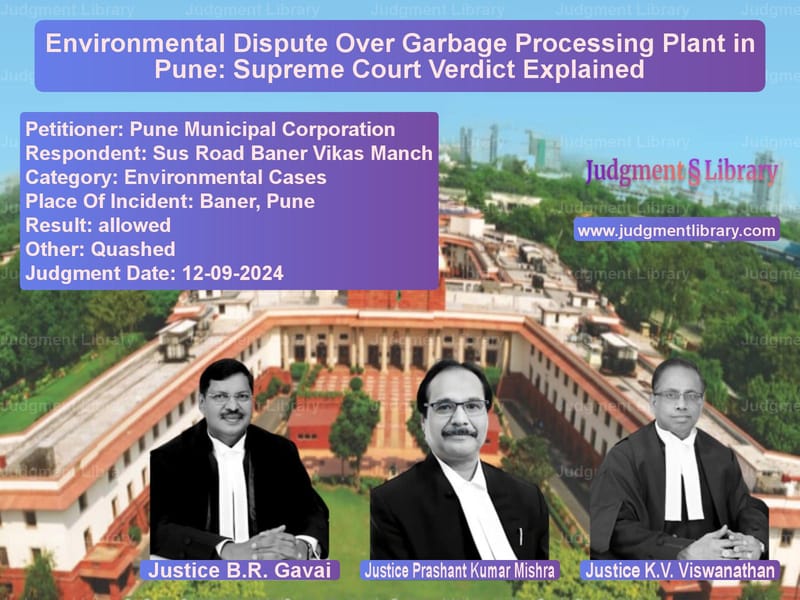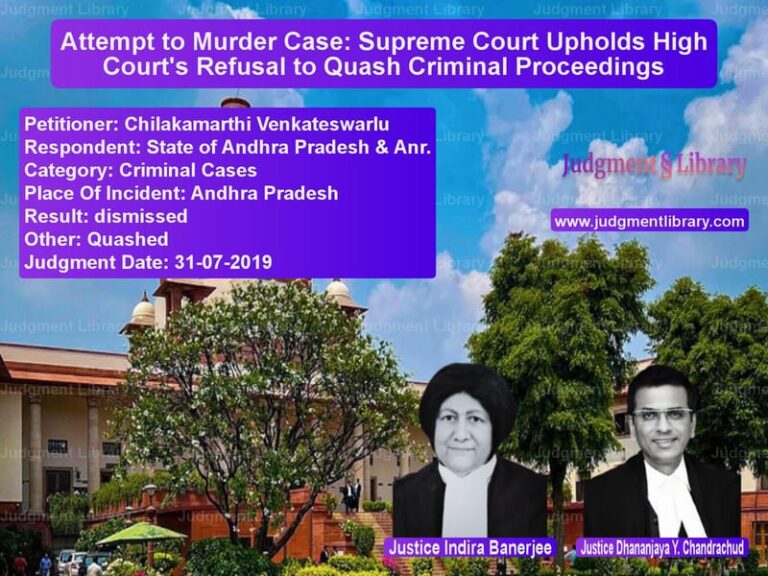Environmental Dispute Over Garbage Processing Plant in Pune: Supreme Court Verdict Explained
The case between Pune Municipal Corporation (PMC) and Sus Road Baner Vikas Manch revolved around the operation of a Garbage Processing Plant (GPP) in Baner, Pune. The dispute arose when residents alleged that the GPP violated environmental norms and caused severe pollution, while PMC defended its necessity for waste management.
Background of the Case
In 2002, PMC extended its municipal limits to include Baner Balewadi and designated land in Survey No. 48/2/1 for a GPP. In 2015, PMC entered into a Concession Agreement with Noble Exchange Environment Solution Pune LLP to set up an Organic Waste Processing Plant.
Despite obtaining environmental clearance and multiple authorizations from the Maharashtra Pollution Control Board (MPCB), the plant faced opposition from Sus Road Baner Vikas Manch, a trust representing local residents. They approached the National Green Tribunal (NGT), arguing that the plant was built without due compliance with environmental norms.
Arguments Presented
Arguments by Pune Municipal Corporation
- The land was reserved for a GPP in the Development Plan of 2002, and no objections were raised initially.
- The GPP was approved by MPCB and the State Level Environment Impact Assessment Authority (SEIAA).
- The plant played a critical role in waste management, preventing environmental hazards from waste dumping.
- Residents moved into the area after the GPP was approved, making their objections invalid.
- The project was executed in compliance with the Solid Waste Management Rules, 2000, which were applicable before the 2016 Rules were introduced.
Arguments by Sus Road Baner Vikas Manch
- The plant emitted foul odors and caused severe pollution, impacting residents’ health.
- The site was originally designated for a biodiversity park.
- The plant violated buffer zone requirements under the Solid Waste Management Rules, 2016.
- MPCB had not granted separate consent under the Water Act, 1974 and the Air Act, 1981.
- GPP’s operations were affecting the living conditions of residents, causing a significant environmental nuisance.
Supreme Court’s Key Observations
The Supreme Court carefully examined whether the GPP violated environmental norms and whether its closure was necessary.
1. Legality of the GPP’s Establishment
The Court noted that the GPP was conceived and approved before the 2016 Rules came into force. It stated:
“The application for authorization, grant of authorization, and the commencement of the GPP all took place before 8th April 2016. As such, the Tribunal erred in applying the 2016 Rules retroactively.”
2. Pollution and Odor Concerns
The Court acknowledged that some environmental concerns existed but did not warrant the plant’s closure. Instead, it directed PMC to implement additional odor control measures.
3. Buffer Zone and Biodiversity Park
The Court rejected the claim that the plant was meant for a biodiversity park, stating:
“The land has been designated for a GPP since 2002, and all residential buildings in the area were built later. Thus, the argument that the plant should be converted into a biodiversity park is baseless.”
4. Authorization and Environmental Clearances
The Court ruled that the necessary permissions had been obtained under the applicable laws and that new regulatory requirements could not be applied retroactively.
Final Judgment
The Supreme Court quashed the NGT’s order that directed the plant’s closure. However, it imposed several environmental safeguards:
- PMC must install odor control systems and portable compactors by December 2024.
- A green cover must be created around the plant to minimize its environmental impact.
- The National Environmental Engineering Research Institute (NEERI) must conduct audits every six months.
- A bitumen road and concrete reject area must be constructed to prevent waste accumulation.
Impact of the Judgment
The ruling clarifies that municipal waste processing plants cannot be arbitrarily shut down based on public objections if they follow the law. However, it also stresses the importance of ensuring that such facilities operate without causing undue environmental harm.
With PMC ordered to take corrective measures, the case serves as a landmark decision in balancing urban waste management needs with environmental concerns.
Petitioner Name: Pune Municipal Corporation.Respondent Name: Sus Road Baner Vikas Manch.Judgment By: Justice B.R. Gavai, Justice Prashant Kumar Mishra, Justice K.V. Viswanathan.Place Of Incident: Baner, Pune.Judgment Date: 12-09-2024.
Don’t miss out on the full details! Download the complete judgment in PDF format below and gain valuable insights instantly!
Download Judgment: pune-municipal-corpo-vs-sus-road-baner-vikas-supreme-court-of-india-judgment-dated-12-09-2024.pdf
Directly Download Judgment: Directly download this Judgment
See all petitions in Environmental Cases
See all petitions in Public Interest Litigation
See all petitions in Judgment by B R Gavai
See all petitions in Judgment by Prashant Kumar Mishra
See all petitions in Judgment by K.V. Viswanathan
See all petitions in allowed
See all petitions in Quashed
See all petitions in supreme court of India judgments September 2024
See all petitions in 2024 judgments
See all posts in Environmental Cases Category
See all allowed petitions in Environmental Cases Category
See all Dismissed petitions in Environmental Cases Category
See all partially allowed petitions in Environmental Cases Category







